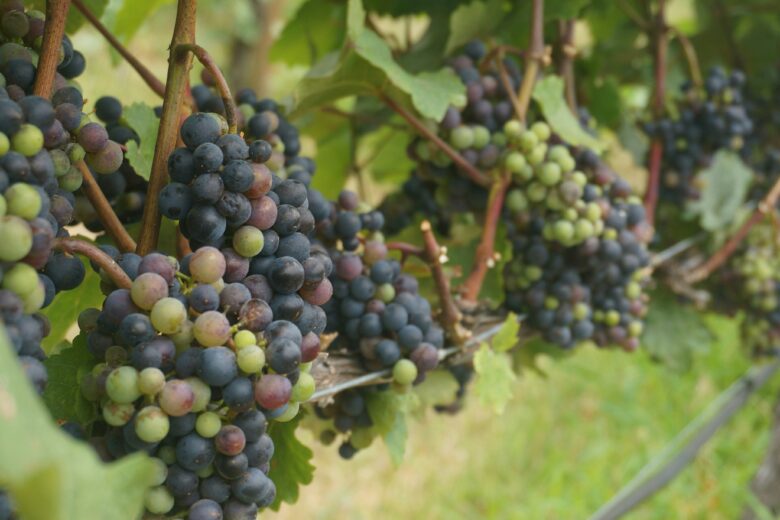When we first moved to the farm, my dream was to incorporate as many Biblical elements as possible into our land. Seeing sheep gently graze beyond the kitchen window is an answered prayer, but it’s also a quiet whisper to my heart: “Trust the Good Shepherd.” Vibrant wildflowers, like ironweed, thistle, and goldenrod, now adorn the fields, and my spinning heart is stilled, again. The critters, bees, and a garden of beautiful reminders have made this farm-life a constant link to Our Lord.
That doesn’t mean we do this whole homesteader thing perfectly.
I don’t come from a family of farmers. I married a ballplayer. Simply stated: we still have a lot to learn, and Wade’s shepherd’s staff is a Louisville Slugger.
When they said it’d take three years for our grapes to be established, I purchased and planted Mars and Concord grapes and started the countdown. This spring, our vines were covered with sweet-smelling, delicate flower clusters. Weeks and months marched on, and bundles of tiny grapes decorated the vines. As the fruit grew closer to that perfect ripeness, I imagined how satisfying it would be to taste and see a combination of homemade bread and fresh grapes on my table. Like waking up from a dream too good to be true, the next time I walked out to the grapes, they were gone. Not one grape! Fat mockingbirds gloated, warbled, and trilled in and out of the nearby rhododendron. I carried my little basket home and begrudgingly scribbled “Smucker’s” onto the store list.
I’m fascinated with the Church’s liturgical calendar and its ancient ties to the seasons, but as life and work move indoors and becomes more industrialized, we are largely removed from optional celebrations such as Ember Days. In each of the four seasons, Ember Days may be observed with prayer and fasting to give honor and thanks to God for the gifts of Creation.
The days are recognized on a Wednesday, Friday, and Saturday. On Wednesday, we remember the day Christ was betrayed, Friday for when He was crucified, and Saturday when He was entombed. The group of three days together is collectively called “Embertide,” and each season focuses on gratitude for different blessings. In the winter, we give thanks for the olive harvest which gives us the oils used in the Church. In spring, we praise the Lord for light and longer days. In summer, we are grateful to God for the wheat that will feed the world. Traditionally, autumn Ember Days are for giving thanks to God and asking for His help to be good stewards of the grape harvest.
But I have no grapes.
I would say almost every other farming operation would determine success by measuring output and weighing it with land, labor, and material inputs. It’s probably because we started this Ag-adventure as beekeepers where the success rate is less than 50%, or maybe it’s remnants of baseball days where a batting average of 1 out of 3 keeps you in uniform, but I still count this year and our exactly zero grapes as a win. I weigh the land that the boys roam, even all the mud, dirt, grass, and leaves that they drag into the house, and the labors of love that is tending this place, and I count it all as gifts. I hear St. Paul above the jeers of mockingbirds: “Give thanks in all circumstances; for this is the will of God in Christ Jesus for you,” (1 Thessalonians 5:18).
Wednesday, September 18, is the start of this season’s Embertide. Yet, I think it’s always the right time to express gratitude for the gifts of the Earth, the work of human hands, the Bread of Life, the Chalice of Salvation, and to praise God from whom all blessings flow.
Blessed Ember Days!
